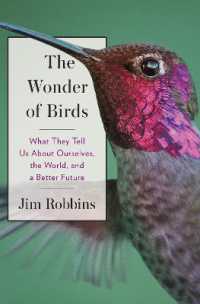Full Description
Initial Language Teacher Education provides language teacher researchers, as well as teachers of teachers, with an introduction to research on how language teachers learn to teach before they begin practicing.
Theoretical work is organized into the author's original framework, which fosters the exploration of student teachers' experiences as learners, while helping them develop core concepts, practices, and dispositions that encourage excellence in teaching. This innovative framework also provides mediated learning experiences designed around student teachers' professional development, an approach that helps them to theorize their own practices and take ownership of their own professional development at an intellectual level.
By combining a strong and updated research base with practical classroom tools that have been extensively piloted, Initial Language Teacher Education bridges the gap between theory and practice in teacher education and is a key resource for students, researchers, and instructors in language teaching.
Contents
Table of Contents
Part 1 *
From Research to Implications *
Summary *
Initial teacher education: A contested field *
Traditions in initial teacher education *
The Sociocultural Turn in Second Language Teacher Education *
Learning and the Zone of Proximal Development. *
Understanding the Mediated Learning Experience *
Teacher learning and the Sociocultural perspective *
Obuchenie and perezhivanie in Vygotsky's theory. *
Everyday and scientific concepts. *
Understanding student teachers' learning and development *
Stage 1: Early idealism. *
Stage 2: Personal survival. *
Stage 3: Dealing with difficulties. *
Stage 4: Hitting a plateau. *
Stage 5: Moving on. *
Implications of the Research: What We Can Learn about Initial Teacher Education Practices *
Implications of adopting a Sociocultural Perspective *
Implications of seeing learning as Mediated Activity *
Implications of a staged view of student teacher development *
From Research to Application: Towards a Framework for organic mediation of language teacher learning in ITE *
a. Engaging *
b. Noticing, *
c. Accessing *
d. Bridging *
e. Launching *
f. Extending *
Looking ahead *
Part 2 *
From Implications to Application *
Summary *
Introduction *
Learning to See *
Activity # 1: What is going on in this picture? *
Activity # 2: Codification: My first supervised teaching practice *
Activity # 3: Evidence, Reasons, Recollections *
Activity # 4: Sound only, then picture & sound *
Activity # 5: Deconstructing a core professional concept *
Activity # 6: How would my teacher have done it? *
Activity # 7: It's all in the details *
Activity # 8: Running observation *
Activity # 9: Annotated observation *
Activity # 10: I see myself in it *
Activity # 11: K-W-L + Chart *
Activity # 12: Memory cards *
Activity # 13: Fishbowl feedback *
Activity # 14: Pre-observation interview script *
Activity # 15: Experiential Learning *
Activity # 16: Connections, connections, and more connections *
Activity # 17: Exempli gratia *
Learning to Do *
Activity # 18: Modeling *
Activity # 19: Protocols *
Activity # 20: Scaffolded Planning *
Activity # 21: Change one *
Activity # 22: Loop Input *
Activity # 23: Rewriting a lesson plan *
Activity # 24: Looking for learning *
Activity # 25: A picture is worth a thousand words *
Activity # 26: Collective rubric creation *
Activity # 27: Alternatives, alternatives *
Activity # 28: Micro Teaching *
Activity # 29: Classroom narrative *
Activity # 30: Pentagonal Possibilities *
Activity # 31: Think and Write *
Learning to Become *
Activity # 32: Lesson critique *
Activity # 33: Connecting to someone else's experience *
Activity # 34: Eyewitness accounts *
Activity # 35: Anonymous *
Activity # 36: Reflective Journals *
Activity # 37: Topic wrap up *
Activity # 38: Feedback sessions that C.A.R.E. *
Activity # 39: Book club presentations *
Activity # 40: The lesson plan under a microscope *
Activity # 41: It's all about being prepared *
Activity # 42: What I learned NOT to do! (or simply, do differently) *
Activity # 44: Supported Experiments *
Activity # 45: Exploring possible selves *
Activity # 46: Connections, connections, connections *
Part 3 *
From Application to Implementation *
Summary *
Introduction *
If you are a ToT working in short or intensive programs *
Ways to proceed *
2. If you are a ToT working in BA or similarly extended program *
Ways to proceed *
If you are a ToT working in Diploma or MA programs *
Ways to proceed *
Part 4 *
From Implementation to Research *
Summary *
Introduction *
Mel's classroom research story *
Investigating modes of delivery and input on CELTA courses *
Some possible ways to get started with research *
References *








